In his book Outliers, Malcolm Gladwell talks about the 10, 000 hour rule. No matter how clever you are, if you really want to be good at something, you have to practice. And practice. And practice. In short, according to Gladwell and others, you need to accumulate 10, 000 hours of time at a task to really master it. 10, 000 hours is over 400 days straight. So by ordinary application, it’s full days for a few years. Or some practice, every day, over several years.
My 10, 000 hours are accumulated in two things. Cooking and writing.
First to the writing. It is the easier to account for. Two degrees one after another, both involving a great deal of writing. One involving a ‘substantial contribution to scholarship’ and a big fat dissertation. Collectively, this took over 12 years of writing every day, almost. There were a few days when I didn’t write, but not many.
The second of my 10, 000 hours, cooking has taken longer to accumulate. I started when I could reach the bench. My first cook book was a large format 1979 Ladybird book called We Can Cook it featured animal character cartoons as illustrations. It had a fruit cake recipe, which I made and foisted on people.
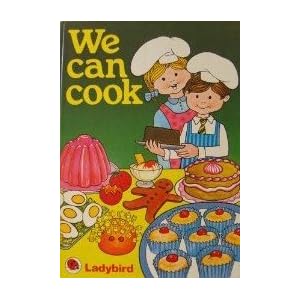
I wish I still had that book. I cooked often for my whole family and by my early teens could be relied upon to turn out dinner for us all when required. We had a fuel stove, so before you could cook, you had to attend to the fire. This taught me a lot about preparation.
Yesterday, I was reading Charlotte Wood’s food blog How to shuck an oyster and I read two great pieces that I wanted to comment on, but was concerned about essay length blog comments. The first is about a book I really want to read by Julian Barnes and the second, is about Conflict in the Kitchen and power struggles between couples when cooking for other people. These two pieces resonated with me together as much as separately.
Cooking as Conversation is a ‘review’ of sorts of Julian Barnes’ book entitled, Pedant in the Kitchen. Charlotte quotes from the book;
‘The result of all this…is that while I now cook with enthusiasm and pleasure, I do so with little sense of freedom or imagination. I need an exact shopping list and an avuncular cookbook.’
What is interesting to me here, is as Charlotte says, he is expressing his true nature. Barnes is a pedant, a nick picker and a bit not self-sensoring. It struck me right there that this what Robert is like when he cooks. This is how he cooks. Not so much the lacking in imagination, but more the requirement for precise instructions, and everything exactly as it says in the book. Almost always, when he cooks, it looks precisely like the picture. It is delicious and wonderful. But it is not fast, it is not spontaneous and there is always a mountain of washing up.
It is also, the complete opposite of how he does almost everything else. And it’s not like he doesn’t have his 10, 000 hours up. After all, years of working in cafes, sandwich shops and making pancakes for a living, as well as cooking for his family, have easily seen him meet the challenge. Perhaps it is this experience of cooking on a large scale, of the necessity of getting it right to earn money, that lead to his technique and approach.
In fact, in the kitchen, it is like we both are our mirror selves. Robert gets precise, and adheres to a script as if the meal depends on it. Even recipes he has made hundreds of times, he nearly always looks it up. I am completely the opposite. And this is in some way the opposite of myself too.
I make it up. If you open the fridge and want something for dinner, I am your woman. I can pull stuff together out of seemingly thin air. Robert would be off down the shops, with a list in his hand. And in that time I could have made the pasta. Spontaneous, making do, cutting corners to get a more efficient result, adapting recipes as I go to shorten the time taken, to chop out the faffing around.
This brings me to a second piece from How to shuck an oyster, Conflict in the Kitchen. We have, as a couple, had some conflict about who is going to cook when, who cooks the show pieces and who does the work-a-day meals. In our house we have very difference approaches and different skills, most of them complementary. I never have to make pastry again, for to do so would be a total waste of time, so good is Robert’s. But when it comes to the crunch of churning out weekday meals, it is just easier and faster if I do it. I am fond of spending a relaxing few hours on a Sunday making dishes for the week to keep things easy. Robert would just head to the shops every day.
Dinner parties cause conflict, especially in the planning phase. We fight over what to have. We disagree about the menu. We argue about the tried and true versus the opportunity to make something new or different. It would be nice if we could work together, share, make love on the kitchen floor, but our competitive natures won’t let us. Our egos fight it out. We argue. We clutch our favourite books, shouting menu suggestions across the house.
And then Robert trumps me. ‘I’ll get the fish kettle out.’ As soon as he says that, I opt out. I go and find candles and polish glass ware. ‘What am I supposed to make if you are going to poach a whole bloody salmon?’
All of it comes from love. All of it comes from the joy of making something delicious. But make no mistake, it’s a fight to the death. Whose cuisine will reign supreme?
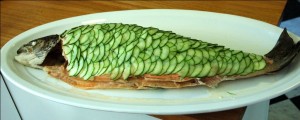
9 February 2008 - Party Salmon photo Robert Gotts
To buy Charlotte’s new book Love and Hunger click here

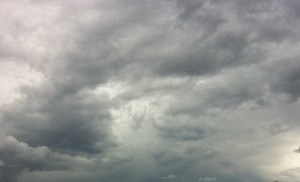





 Too long has passed since I was honoured by lovely
Too long has passed since I was honoured by lovely 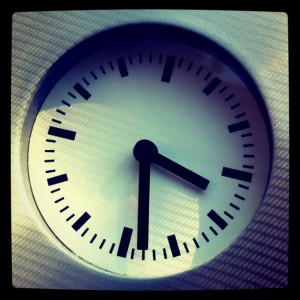
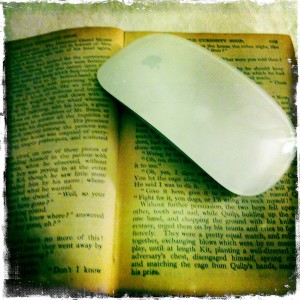


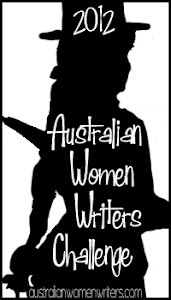
Recent Comments